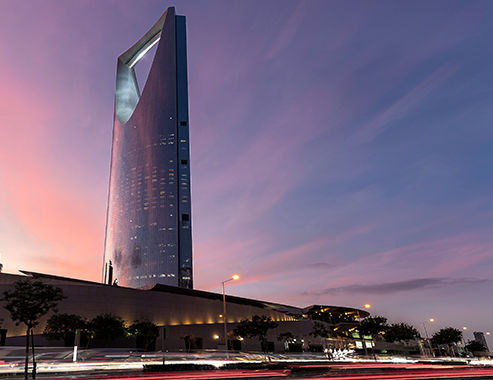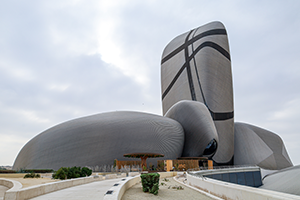


The Kingdom of Saudi Arabia
The Kingdom of Saudi Arabia (KSA) is situated on the Arabian Peninsula in the Middle East, bordered by Jordan and Iraq to the north, Kuwait to the northeast, Bahrain and Qatar to the east, the United Arab Emirates to the southeast, Oman to the south, and Yemen to the south and southwest. It also has extensive coastlines along the Red Sea to the west and the Persian Gulf to the east. This strategic location has historically made Saudi Arabia a significant regional cultural and trade hub.
Saudi Arabia’s desert climate presents unique challenges, with extremely hot summers, temperatures often soaring above 40°C (104°F), and mild winters. The central and northern regions can see cooler winter temperatures, occasionally nearing freezing, while the coastal areas along the Red Sea and the Persian Gulf are more humid. Despite these harsh conditions, the country has adapted its infrastructure and lifestyle to manage these extremes effectively, showcasing its resilience and adaptability.
Saudi Arabia, known globally for its vast oil reserves, is one of the world’s leading oil producers and exporters. Saudi Aramco’s state-owned oil company is one of the largest and most profitable corporations. The Kingdom is also renowned for its religious significance, being home to Mecca and Medina, the two holiest cities in Islam. Economically, Saudi Arabia is working to diversify its income sources beyond oil. Its ambitious Vision 2030 plan aims to develop other sectors like tourism, entertainment, healthcare, and education. This plan seeks to enhance the quality of life for its citizens, improve infrastructure, and attract foreign investment, positioning Saudi Arabia for sustainable future growth and development.
Visa Eligibility, Types and Process
Visa Eligibility
Saudi Arabia’s job market is undergoing significant transformation as the country aims to diversify its economy through Vision 2030. Traditionally dominated by the oil and gas industry, the job market is now expanding into various sectors such as tourism, entertainment, technology, healthcare, and education. The government is investing heavily in large-scale infrastructure projects, which are creating numerous job opportunities for both local and expatriate workers. Additionally, initiatives to boost entrepreneurship and small to medium-sized enterprises (SMEs) are fostering a more dynamic and diverse employment landscape.
- Valid Passport: Must have a passport valid for at least six months beyond the intended period of stay.
- Job Offer: A confirmed job offer from a Saudi employer who will act as your sponsor.
- Work Contract: An official work contract endorsed by the Saudi Chamber of Commerce and Ministry of Foreign Affairs.
- Educational and Professional Qualifications: Relevant degrees, diplomas, or certificates that align with the job role.
- Medical Examination: A medical report from an approved clinic confirming good health.
- Police Clearance: A criminal record check from the applicant’s home country.
- Visa Application Form: Completed and signed visa application form.
- Visa Fee Payment: Payment of the applicable visa fees.
Application Process
Applying for a work visa in Saudi Arabia involves several steps and coordination between the applicant, the employer, and various Saudi authorities. The process is designed to ensure that foreign workers meet the necessary requirements and that their employment aligns with the country’s labour regulations. Here is a detailed overview of the application process and the expected processing time.
- Job Offer and Contract: The process begins with securing a job offer from a Saudi employer, who provides a formal job contract that must be endorsed by the Saudi Chamber of Commerce and the Ministry of Foreign Affairs.
- Sponsorship and Approval: The employer acts as the sponsor and submits an application to the Ministry of Human Resources and Social Development (MHRSD) for approval to hire a foreign worker.
- Visa Authorization: Upon receiving approval from MHRSD, the employer obtains a visa authorization number and a block visa from the Ministry of Foreign Affairs (MOFA).
- Medical Examination: The applicant undergoes a medical examination at an approved clinic to confirm their health status. A medical report is required as part of the application.
- Police Clearance Certificate: The applicant must provide a police clearance certificate from their home country, indicating a clean criminal record.
- Document Submission: The applicant submits all necessary documents, including the endorsed job contract, medical report, police clearance, passport, visa authorization number, and completed visa application form to the Saudi embassy or consulate in their home country.
- Visa Fee Payment: The applicable visa fees are paid, and the payment receipt is included with the application.
- Interview (if required): In some cases, the applicant may be required to attend an interview at the Saudi embassy or consulate.
- Visa Issuance: After reviewing the application and documents, the Saudi embassy or consulate issues the work visa, allowing the applicant to travel to Saudi Arabia.
The processing time for a Saudi Arabia work visa can vary, but it typically takes between 2 to 4 weeks from the time of submission to the Saudi embassy or consulate. This timeframe can be influenced by factors such as the completeness of the application, the need for additional documentation, and the applicant’s country of origin. It is advisable to start the application process well in advance of the intended start date of employment to accommodate any potential delays.
Visa Types
In Saudi Arabia, the visa application process is primarily managed by the Ministry of Foreign Affairs (MOFA) and the Ministry of Human Resources and Social Development (MHRSD). The Ministry of Foreign Affairs is responsible for the overall administration and issuance of visas, while the Ministry of Human Resources and Social Development oversees the employment aspects, ensuring that foreign workers meet the country’s labor regulations. Additionally, the Saudi Arabian embassies and consulates abroad handle visa applications and provide assistance to applicants.
1. Employment Visa (Iqama):
Issued for long-term employment; requires sponsorship by a Saudi employer and allows residency in the country.
2. Temporary Work Visa:
Granted for short-term work assignments and specific projects; typically valid for 3 to 6 months.
3. Seasonal Work Visa:
Designed for workers engaged in seasonal activities, often in agriculture or during the Hajj season.
4. Commercial Visit Visa:
For business professionals visiting for short-term business meetings, conferences, or negotiations.
5. Work Visit Visa:
Issued for professionals visiting on a short-term basis to provide technical or consultancy services.
6. Family Visit Visa:
Enables expatriates working in Saudi Arabia to bring family members for short visits; not for employment purposes.
Visa Fees
The fees for a Saudi Arabia work visa can vary depending on the type of visa and the applicant’s nationality. Generally, the main costs associated with a Saudi work visa include:
1. Visa Application Fee:
This fee is typically paid to the Saudi embassy or consulate at the time of application. It varies but is usually around USD 100 to USD 300.
2. Issuance Fee:
This fee is charged by the Saudi government for issuing the work visa. It can range from USD 200 to USD 400.
3. Iqama (Residence Permit) Fee:
Once in Saudi Arabia, expatriates need to obtain an Iqama, which has an associated fee. The cost for an Iqama is approximately USD 100 to USD 200 annually.
4. Medical Examination Fee:
The cost of the mandatory medical examination varies by clinic and country but generally ranges from USD 50 to USD 150.
5. Additional Fees:
There may be additional fees for processing and administrative services, which can vary.
Benefits of Working in Kuwait
01
Tax-Free Income: Salaries in Saudi Arabia are generally tax-free, allowing expatriates to keep their full earnings without deductions for income tax.
02
Competitive Salaries and Benefits: Many positions in Saudi Arabia offer competitive salaries and additional benefits such as housing allowances, transportation allowances, and annual flight tickets home.
03
High Standard of Living: Saudi Arabia provides a high standard of living with modern amenities, including well-developed infrastructure, shopping centers, and healthcare facilities.
04
Career Growth Opportunities: The country’s ongoing economic diversification and large-scale infrastructure projects create numerous career opportunities in various sectors, including finance, healthcare, engineering, and technology.
05
Cultural Experience: Working in Saudi Arabia offers a unique cultural experience with the opportunity to explore the rich heritage of the Arabian Peninsula, including historical sites, traditional festivals, and local cuisine.
06
Expatriate Community: A sizable expatriate community exists in Saudi Arabia, providing a support network and opportunities for social interaction and networking.
07
Savings Potential: The combination of tax-free income and often generous compensation packages enables expatriates to save a significant portion of their earnings.
08
Safety and Security: Saudi Arabia is known for its low crime rates and strong security measures, contributing to a safe living and working environment.
09
Opportunity for Travel: The country’s central location in the Middle East provides easy access to neighboring countries and regions, making it convenient for travel and exploration.
Conclusion
Saudi Arabia presents a compelling opportunity for expatriates with its tax-free income, competitive salaries, and a high standard of living. The country’s ongoing economic diversification under Vision 2030 creates ample career opportunities across various sectors, while its rich cultural heritage and well-developed infrastructure enhance the expatriate experience. Despite the challenges of its desert climate, Saudi Arabia’s modern amenities and low crime rates contribute to a secure and rewarding environment for professionals seeking new horizons.
While expatriates can enjoy numerous benefits while working in Saudi Arabia, obtaining Saudi citizenship is generally not an option for foreign workers, as citizenship is predominantly reserved for Saudi nationals. However, expatriates can benefit from comprehensive insurance coverage, which typically includes health insurance as part of their employment package. This coverage ensures access to quality healthcare services, contributing to their overall well-being and peace of mind while residing in the Kingdom.
